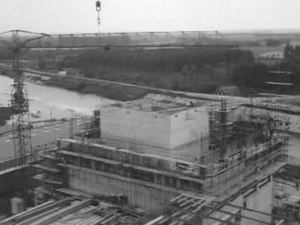Dodewaard nuclear power plant
| Dodewaard nuclear power plant | |
|---|---|
 The Dodewaard NPP today in its shut down state viewed from the Rhine river bank | |
 | |
| Country |
|
| Coordinates | 51°53′58″N 5°41′10″E / 51.89944°N 5.68611°ECoordinates: 51°53′58″N 5°41′10″E / 51.89944°N 5.68611°E |
| Status | Decommissioned |
| Commission date |
|
| Decommission date |
|
| Operator(s) |
|
| Nuclear power station | |
| Reactors | 1 |
| Reactor type | |
| Power generation | |
| Nameplate capacity |
|
| External links | |
| Website | www |
| Commons | Related media on Commons |
Dodewaard nuclear power plant was a nuclear power plant with a boiling water reactor (BWR) of General Electric in the Dutch town of Dodewaard. The plant halted energy production in 1997. Its final decommissioning has been postponed for a period of 40 years and was placed into a safe enclosure configuration in 2005.
History[]
The plant in Dodewaard was the first nuclear power plant established in the Netherlands. It was built by the Dutch government, mainly as a means to obtain know-how about the construction and exploitation of a nuclear power plant. The plant was therefore relatively small with a net output of only 58 MW. Construction was started in 1965 and the facility opened on March 26, 1969, in the presence of Queen Juliana.[1]
Since the Chernobyl disaster in 1986, the political tide turned against nuclear energy, which was already a heavily debated issue in Dutch politics. With no prospect of the construction of new nuclear power plants in the Netherlands, Dodewaard's function as a research centre became superfluous. The ownership decided to halt the relatively small and expensive electricity production in 1997.[1]
Closure[]
On 26 March 1997 the complex was shut down, 7 years earlier than originally planned.[2] The complex is being dismantled in phases. Firstly, all fissionable material was removed, followed by a complete closure of the buildings to trap any remaining radioactivity. After a period of 40 years, the plant will be demolished and the site will become available for other purposes.[3]
On 9 April 2005, the last remaining fissionable material was removed and on 1 June 2005, the 40-year waiting period went into effect. The complex remains tightly guarded.
On 21 May 2020 a fire broke out on the roof of the outer containment building which took several hours to bring under control. According to the authorities no radioactive material was released into the environment during the incident.[4]
References[]
- ^ a b GKN. "Historie kernenergiecentrale te Dodewaard (KCD): Het Begin". www.kcd.nl (in Dutch). Retrieved 2020-05-21.
- ^ Arentsen, Maarten J. (2006). "Contested Technology: Nuclear Power in the Netherlands". Energy & Environment. 17 (3): 373–382. doi:10.1260/095830506778119407. ISSN 0958-305X.
- ^ GKN. "Historie kernenergiecentrale te Dodewaard: Het Einde". www.kcd.nl (in Dutch). Retrieved 2020-05-21.
- ^ "Fire at Shuttered Dutch Nuclear Plant; No Radiation Risk". The New York Times. 2020-05-21. ISSN 0362-4331. Retrieved 2020-05-21.
External links[]
 Media related to Dodewaard Nuclear Power Plant at Wikimedia Commons
Media related to Dodewaard Nuclear Power Plant at Wikimedia Commons- New Dutch Nuclear Power Station (1969) on YouTube
- Nuclear power stations with closed reactors
- Nuclear power stations in the Netherlands
- Buildings and structures in Gelderland
- Neder-Betuwe

